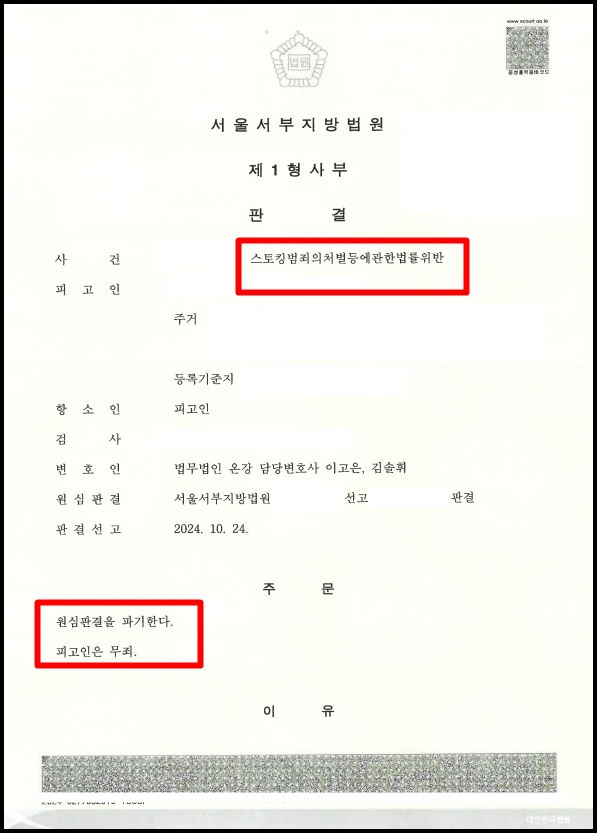[Case Overview].
The client thought she had met a man through the application and started a relationship, only to find out that he was in a two-legged relationship with another girlfriend.
The client sent a social media message to the other woman, who was also a woman, to let her know about the incident. The other woman responded by calling the client abusive names, telling her not to contact her, and attempting to call her several times afterward.
The client felt embarrassed and frightened by the other person's demeanor and avoided the phone, asking them not to contact her. Suddenly, the other person changed their demeanor and said, "I'm too scared, don't contact me." The other person edited some of the messages the client had sent since then and accused her of violating stalking laws.
The client was dumbfounded that he was being sued when he had been the subject of abusive language and repeated attempts to contact him first.
The client was prosecuted alone during the investigation phase and was eventually convicted of a fine of KRW 10 million despite having a defense lawyer at the first trial. The client was so frustrated that he was driven to extreme thoughts, and his mother came to Ongang Law Firm with tears in her eyes asking for help.
[Case Features and Issues].
The case was a violation of the Stalking Penalties Act, for which he had already been convicted in the first instance, making it very difficult to overturn the conviction and obtain an acquittal on appeal.
The client argued that his conduct occurred in the course of a simple emotional dispute and did not have the "repetitiveness," "persistence," and intent or effect of "causing fear or anxiety" to the other person, which are key elements of the crime of stalking.
There were also many contradictions in the complainant's statements that made her credibility questionable, and there was evidence that she had first tried to contact the client with abusive language and repeated attempts to contact her.
The trial court did not look at the full context of these events and appeared to convict based on the accuser's one-sided allegations and partial messages.
Therefore, our primary issue was to demonstrate that the statutory elements of the crime of stalking were not met, pointing to the trial court's lack of hearing, mistake of fact, misapplication of law, and disproportionate sentence to our client's circumstances.
[Helping hands on the river].
After careful review of the case record, we determined that our client's innocence was strong enough to clear his name.
We conducted a thorough chronological analysis of the entirety of the messages before and after the incident, and found that our client's behavior was not one-sided stalking, as the complainant alleged, but rather occurred in the course of a mutual emotional argument.
In particular, we emphasized that the accuser first engaged in "pre-stalking" behavior by calling our client unspeakable names and repeatedly attempting to call her, and we argued, based on the legislative intent of the stalking statute and Supreme Court precedent, that the messages our client sent after the accuser's sudden change in demeanor were episodic and did not meet the "persistence" and "repetition" requirements necessary to establish the crime of stalking.
We argued that our client had "probable cause" to contact the woman in the first place to inform her of the double leg, and we also obtained medical records related to our client's mental health, which indirectly proved that our client had no intent to stalk.
[Result]
After careful legal analysis and vigorous advocacy by our lawyers, the Court of Appeals accepted all of our arguments.
The trial court found that your client's conduct did not meet the elements of the crime of stalking, reversed the first conviction and acquitted the client.It is very rare and difficult to have a case convicted in the first instance overturned and acquitted on appeal.
However, Ong Kang's penetrating analysis of the case and unwavering legal arguments clearly revealed the client's injustice, and he was finally able to clear his name and get on with his life.
This case illustrates the potential for stalking laws to be unfairly misused and highlights the importance of getting the full picture and arguing your case from the beginning.
[Judgment]




